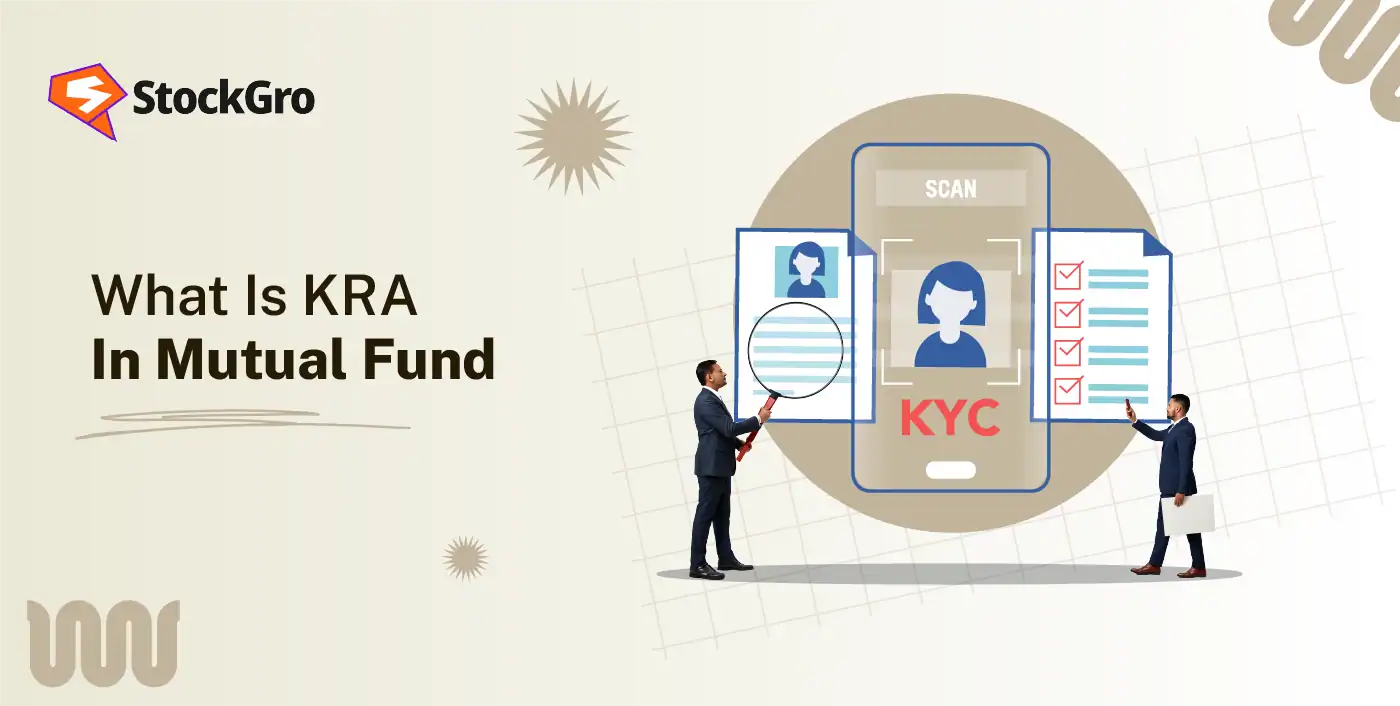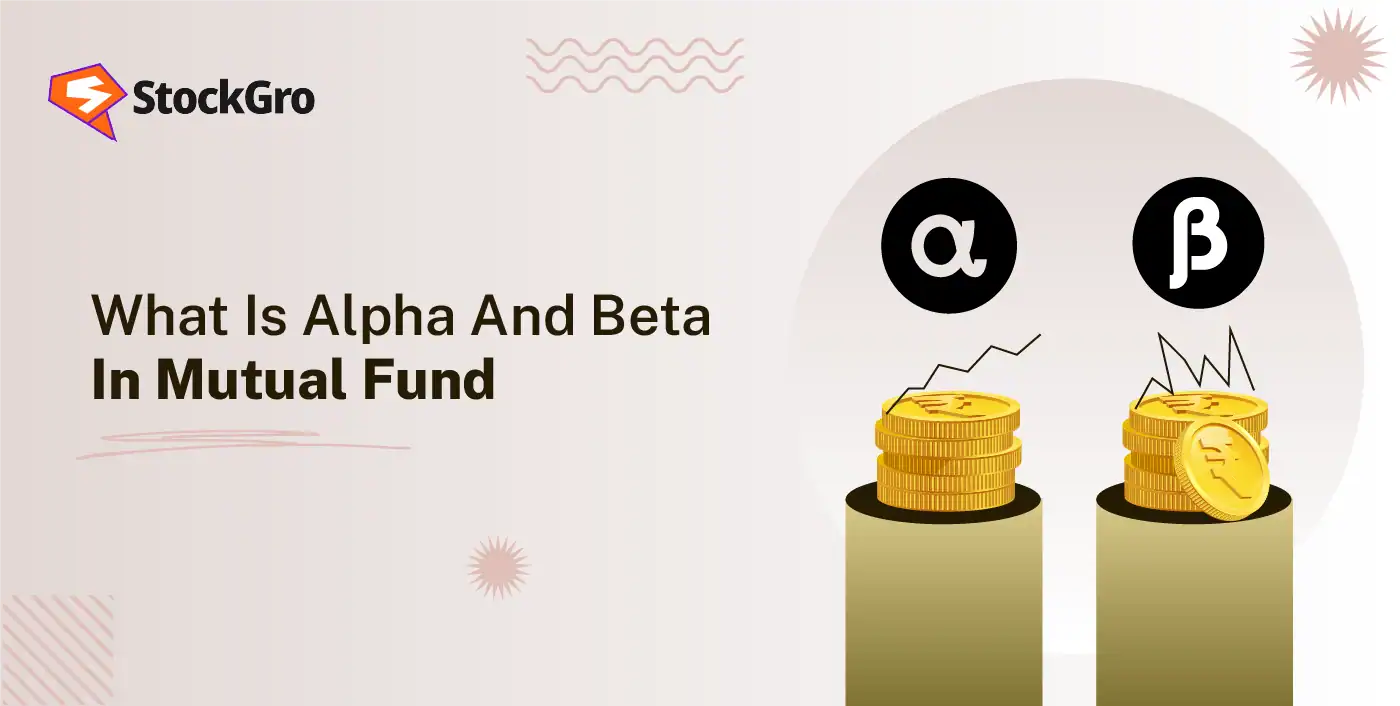
It is vital that you know what KRA (KYC Registration Agency) stands for in the investing mutual funds environment. KRA, as the centrally authorised and investor identification agency approved by SEBI, enables a single verification of the investor’s KYC details shared across all the mutual fund houses. This simplifies investing, ensuring security and compliance. In this blog, learn how KRA streamlines your investment journey hassle-free.
What Is KRA in a Mutual Fund?
KRA in a mutual fund is a KYC Registration Agency, is a body licensed by SEBI to oversee a centralised storage and verification of KYC (Know Your Customer) details for mutual fund investors. When an investor completes KYC via a KRA, their details are valid across all mutual fund houses, eliminating repeated submissions.
This process ensures authenticity, compliance with regulations, and prevents fraud. KRA keeps a digital record of investor KYC data, which not only eases the process but also makes it more efficient. KRA is the centre point for KYC verification, as a result of which, it is convenient and safe for the investors to invest in multiple mutual funds without going through the same KYC process again.
Why KRA Matters for Mutual Fund Investors
KRA matters for investors in mutual funds as it eliminates the tedious part of the KYC process, which is doing KYC for each mutual fund house separately. By doing KYC just once, investors can use the same KYC for all mutual fund houses, thus avoiding the need to do repetitive paperwork and verification for each investment. KRA ensures compliance with regulatory requirements, helps prevent fraud and money laundering by verifying identities, and protects investors by safeguarding their information. It also facilitates smooth and quick investments by making KYC data accessible to all SEBI-registered intermediaries. Overall, KRA improves convenience, security, and efficiency in mutual fund investing.
How the KRA Process Works
The KRA procedure for mutual fund investments works in the following steps:
- Submit a filled KYC application form with proof of identity, proof of address, and a photograph.
- Submit the required documents either offline at the KRA offices or by using the KRA website online.
- The KRA verifies the documents and may require in-person verification (IPV) or video-based IPV.
- After the successful verification, the KRA captures the KYC details of the investor electronically.
- The investor receives a unique KYC identification number.
- This KYC is valid across all mutual fund houses, allowing investors to invest in different funds without repeating the KYC process.
- KRA shares the verified KYC details with SEBI-registered intermediaries as needed.
Key KRAs in India
Key KRAs in India simplify the Know Your Customer (KYC) process for investors across financial markets (including mutual funds) in a significant way. Let’s have a glance at the major KRAs authorised by SEBI.
CAMS (Computer Age Management Services Pvt. Ltd.)
CAMS is one of the major KRA providers in India, offering efficient and seamless KYC services to mutual fund investors. It provides digital KYC solutions that enable investors to complete verification quickly and securely.
Karvy Fintech Private Limited (Karvy KRA)
Karvy KRA provides centralised KYC registration and verification services that are common across mutual funds and securities. As part of Karvy Data Management Services, it supports a streamlined and paperless KYC process with a wide reach throughout the country.
CVL (CDSL Ventures Limited)
CVL functions as a KRA facilitating the maintenance of KYC records for mutual funds and other financial intermediaries. It offers easy access for investors to check, update, and validate their KYC status online.
NDML (NSDL Database Management Limited)
NDML collects KYC data from a common point and simplifies the onboarding of investors, maintaining high standards for security and compliance. Their platform supports the process of effortless verifications, leading to easy investments.
NSE KRA (NSE Data & Analytics Limited)
As a subsidiary of the National Stock Exchange, NSE KRA provides KYC services compliant with regulatory requirements. The objective of this is to allow investors to have a better view and have an easier transaction across different financial instruments.
These KRAs ensure that investors complete the KYC process once and use their verified data across all SEBI-registered intermediaries, thereby streamlining investments and improving security.
How to Check Your KRA Status
Follow these simple steps to find out your KRA status:
- Visit the official website of a KYC Registration Agency (KRA) such as Karvy KRA, CAMS KRA, CVL KRA, or NDML KRA.
- Find the “Check KYC Status” or similar link on the homepage.
- Enter your PAN (Permanent Account Number) and any other details required, such as the captcha and date of birth.
- After entering your details, check your KRA status by submitting the information.
- The status will show whether your KYC is Registered, Validated, On Hold, or Rejected.
- If you face any issues, you can contact KRA support or reach out to your mutual fund distributor for assistance.
Documents & KYC Submission
Mutual fund investment documents & KYC submission typically mean that the investor’s identity and address must be verified by submitting certain essential documents. The primary KYC documents generally required are:
- Identity proof such as PAN card, Aadhaar card, or passport.
- Address proof like a utility bill, ration card, or bank statement.
- A recent passport-sized photograph.
- A duly filled KYC application form.
The submission can be made offline at the authorised KYC Registration Agencies (KRAs) or Points of Service (PoS). Online submissions are also available through digital KYC platforms. The investors might be asked to do the in-person verification (IPV). After the verification, KYC details are uploaded into the central system, allowing effortless investments made at other places without the need for KYC again. This process is mandatory to comply with regulatory norms and ensure secure transactions.
Benefits of the KRA System in Mutual Fund Investing
The KRA system offers several advantages that make mutual fund investing more streamlined, secure, and convenient for investors.
- Simplified KYC process: The investors perform KYC only once, and subsequently, this can be used across all mutual fund houses. Hence, repeated paperwork and verifications are eliminated.
- Time-saving: The KRA system speeds up the verification process. It allows quicker transactions and avoids delays in mutual fund investments.
- Data Security: KRA keeps all KYC information in one secure place using strong security methods. This protects sensitive investor data from unauthorised access.
- Portability: Investors’ KYC details can be accessed by all SEBI-registered intermediaries. This means investors can easily invest across multiple mutual fund platforms without repeating KYC.
- Regulatory Compliance: KRA ensures strict adherence to SEBI guidelines. It helps to stop fraudulent activities and maintain the overall integrity of the market.
- Convenience: Investors have the convenience of checking and updating their KYC status online anytime. Managing KYC details becomes simple and hassle-free this way.
Conclusion
Completing your KRA KYC is crucial for smooth and secure mutual fund investments. It reduces repetitive paperwork, saves valuable time, and ensures adherence to regulatory norms. By centralising your KYC data, KRA enhances data security and facilitates easy updates, making your investment process more convenient and efficient.
FAQs
KRA in mutual funds stands for KYC Registration Agency, authorised by SEBI to collect, check, and centrally store the investors’ KYC data. It permits investors to complete the KYC process once and then use it in all mutual fund houses, which simplifies investments and ensures compliance with regulations.
No, it is not possible to invest in mutual funds if the KRA KYC is not completed. It is mandatory under SEBI regulations and the Prevention of Money Laundering Act to verify your identity and address. Without KYC, investments, SIP registrations, or transactions are not allowed.
Completing KRA offers several advantages. It simplifies the KYC process by allowing you to verify your identity once for multiple investments. It saves time by avoiding repeated paperwork, improves data security through central storage, ensures compliance with regulations, and allows easy access and updates to your KYC details.
Usually, the documents for a KRA PIN registration will be a valid passport or national ID of the applicant, a letter of introduction (if it applies), a business registration certificate for the company, and the KRA PIN application acknowledgement receipt. Additional documents depend on employment status or residency.
CAMS KRA (Computer Age Management Services – KYC Registration Agency) is a SEBI-registered centralised system that maintains and updates KYC records of mutual fund investors and financial intermediaries, streamlining KYC processes for seamless investment and compliance. It ensures secure, accessible data storage and easy online KYC updates.
To check KRA status online, one can go to a KRA portal like CAMS KRA, Karvy KRA, or CVL KRA, enter the PAN, fill in the captcha, and submit to view the KYC status instantly.

